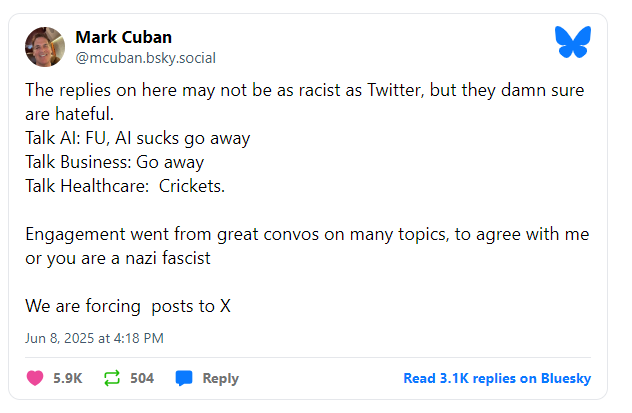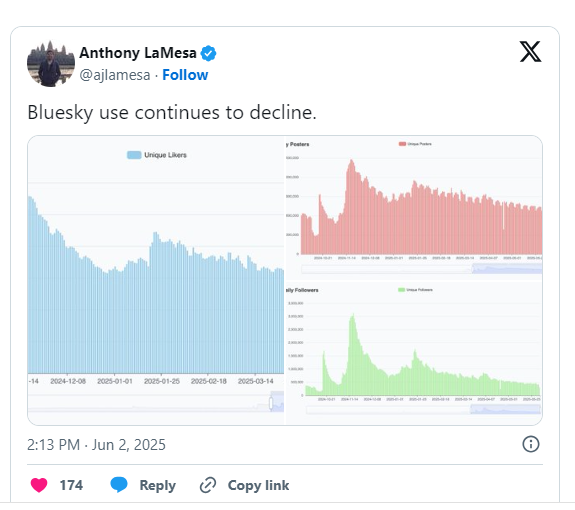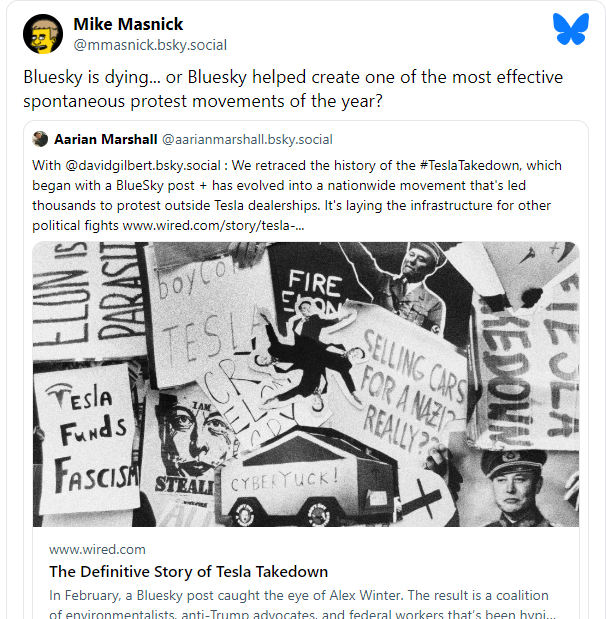Reports of Bluesky's death have been greatly exaggerated

A little over six months ago, I (and pretty much everyone else with a pulse) was writing about Bluesky's meteoric growth, which seemed to be driven in equal parts by frustration with Elon Musk's MAGAfication of Twitter/X and the search for somewhere to talk about Donald Trump and the ongoing dumpster fire that is his presidency. My headline at the time was "Is Bluesky the new Twitter, and if so is that a good thing?" — very similar to one that I wrote for the Columbia Journalism Review six months before that, when I was still the chief digital writer and Bluesky was also growing quickly, even though it was in invitation-only beta. A number of celebrity Twitter users like billionaire Mark Cuban, Alexandria Ocasio-Cortez and Senator Ron Wyden had joined, and plenty would follow. By last November, the network had close to 15 million users, having added more than a million since the election. Now it has about 36 million, or more than twice what it had when I first wrote about it, and it is adding a new user every second.
This is a picture of runaway success, no? A brand new social network born from virtually nothing, built on an open-source, decentralized protocol (I wrote more about that here), with customizable algorithms and other features, and it got 15 million users to sign up in six months, and more than 35 million in a year? Everyone looking for a Twitter replacement must be cheering, right? Wrong. While Bluesky has plenty of fans (and I am one of them) it also has what appears to be a growing number of prominent critics, who raise a number of points: 1) Bluesky is no longer growing quickly, and in fact is shrinking and/or dying; 2) Bluesky has become a noisy and expletive-filled place for those who want to talk dispassionately about a range of subjects, and is also a place that can't take a joke; and 3) Bluesky has siphoned off progressive discussion and created a kind of echo chamber for the left, which blunts its effectiveness.

To take those in reverse order, Megan McArdle of the Washington Post argued that Bluesky isn't doing progressive thought or action any favours, in a piece on June 8th titled "The Bluesky bubble hurts liberals and their causes." The social network, she wrote, was "doomed to fail as users tried to re-create Twitter." McArdle's piece cited a Pew Research Center analysis that found many news influencers had set up accounts on Bluesky but about two thirds of them only posted to the network sporadically, while more than 80 percent of them still posted to X regularly. Engagement on Bluesky peaked in mid-November, she wrote, and is now down about 50 percent, and "the decline shows no sign of leveling out." McArdle's larger point was that exporting progressives from X onto Bluesky’s "beautiful blue bubble" wasn't a good thing for the movement. This effort "isn’t just a doomed attempt to re-create the old Twitter," she said, but is "likely to sap progressive influence and make the movement less effective." She added:
For roughly a decade, Twitter hosted what is lightheartedly called the “national conversation” on issues of the day, particularly social justice and public health. Twitter never had that many users, compared with Instagram or Facebook. But it had a big group of influential users — politicians, policymakers, journalists and academics, all of whom were engaged in a 24/7 conversation about politics and current events. That was a boon to progressives, who wielded outsize influence on the platform because they were early adopters who outnumbered the conservatives. They were also better organized and better networked.
McArdle goes on to say that the people who have emigrated to Bluesky "tend to be those who feel the most visceral disgust for Musk and Trump, plus a smattering of those who are merely curious and another smattering who are tired of the AI slop and unregenerate racism that increasingly pollutes their X feeds." Because the Musk and Trump haters are the largest and most passionate group of these emigres, she argues, the result is "something of an echo chamber where it’s hard to get positive engagement unless you’re saying things progressives want to hear." Negative feedback can also be intense, McArdle says, noting that Ethan Mollick, a professor at the University of Pennsylvania’s Wharton School who studies AI, recently said that he’ll be limiting his Bluesky posting because AI discussions on the platform are too “fraught.”
Note: In case you are a first-time reader, or you forgot that you signed up for this newsletter, this is The Torment Nexus. You can find out more about me and this newsletter in this post. This newsletter survives solely on your contributions, so please sign up for a paying subscription or visit my Patreon, which you can find here. I also publish a daily email newsletter of odd or interesting links called When The Going Gets Weird, which is here.
Agree with me or you are a Nazi
Mark Cuban — the billionaire Shark Tank star behind the Dallas Mavericks and the Cost Plus Drugs project, among other things — is another prominent user who has complained that it's difficult to have a discussion about AI and a number of other topics because the echo chamber of dissent is so vocal. "The replies on here may not be as racist as Twitter, but they damn sure are hateful," Cuban wrote on the same day McArdle's piece appeared, adding that "engagement went from great convos on many topics, to agree with me or you are a nazi fascist." Mike Masnick, who is as big a Bluesky fan as there is (the network is based in part on ideas that he came up with in a 2019 paper called Protocols Not Platforms, and he's a member of the Bluesky board now) has said something similar about AI discussions and how toxic they can become on the network. Many of the responses to Cuban seemed to confirm his point, blaming him for being a billionaire etc.

On June 18, meanwhile, Sean Thomas wrote a piece in The Spectator called "Bluesky is dying." The lead paragraph went something like this:
In the middle of Cairo there’s a place called the City of the Dead. It is a dusty sprawl of mausoleums, sepulchres and crumbling Mameluke tombs, that has housed the corpses of the city for over a thousand years. On a dank winter’s dusk, it feels especially lifeless – deformed dogs vanish into shadows, random fires burn vile rubbish. But that’s when you notice children’s toys. Cheap clothes drying outside a tomb. And you realise, with a shudder: my God, some poor people live here. That, roughly, is the vibe on Bluesky today.
Thomas also wrote that Bluesky was "the social media platform once seen as the great Twitter replacement." It wasn't the first such attempt, he says. adding: "Do you remember Mastodon? You probably don’t, because joining it required a PhD in computer science. First you had to choose a server, then you tried to communicate with the seven other users in your digital iso-pod, but they could only message you every second Thursday, probably from space." He goes on to say that Bluesky was so similar to Twitter that "it looked like a rip-off, akin to a cheap Rolex in Bangkok." After joining the new network, Thomas writes that it became "like a bad vegan café, full of humourless puritans with mouths like cats’ bottoms, eager to congratulate themselves on how much better and nobler they were than the awful centrists back on Twitter. It wasn’t very inviting for people like me. And so, even then, I had the notion: Bluesky is going to fail."
According to Thomas, based on most of the popular metrics for social media, Bluesky is "sliding down a slope that threatens to become a cliff, as a reverse network effect kicks in." The network effect, for anyone who doesn't know, is a term that was coined by Robert Metcalfe, one of the forefathers of the modern internet, who helped develop the Ethernet standard. The principle is that the utility of a network to any individual user grows exponentially the more people are connected to that network — and the reverse of that, naturally, would be that utility declines exponentially the fewer people are connected. Thomas wrote that Bluesky peaked at 1.5 million unique posts per day in late 2024, but is now down to just 700,000; over the same period, daily likes are down from about 2.7 million to 1.5 million (these numbers are verifiable, since a Bluesky engineer maintains a public server with the latest data on network usage).

There will never be another Twitter
Not surprisingly, there has been a lot of pushback on all three of the critical arguments I referred to up above. Many Bluesky fans have said that whether it is growing as quickly as it was, they still enjoy it and get plenty of utility from it (as do I). Is it a liberal echo chamber? Perhaps – but in many ways it seems to act as a counterweight to the right-wing echo chamber most people emigrated from. Masnick also noted that for a social network that is supposed to be dying, Bluesky still managed to help create one of the most effective spontaneous protest movements of the year — the #TeslaTakedown project, which according to Wired started with a post on Bluesky by Joan Donovan, a disinformation researcher, which in turn caught the eye of actor Alex Winter, who has made a number of documentaries focusing on online culture. Winter created a website, and the result was thousands of protests at Tesla dealerships.

Masnick's point is fair, but one specific social movement isn't enough to sustain a network that wants to be a Twitter replacement. Does Bluesky actually want this? According to Wired magazine, CEO Jay Graber (whose given name, Lantian, translates as "blue sky" in Mandarin) "is plotting a total takeover of the social internet." It should be noted that while Bluesky is nominally decentralized, the core of the network that most people use is controlled by Bluesky the company, which has a prominent crypto investor as a major shareholder. Whether this is a problem depends on whom you are talking to. In any case, if Graber was successful in her goal of taking over the entire social internet, would that be any better from a structural point of view than Elon Musk or Mark Zuckerberg controlling it? While it's true that Bluesky's structure allows for competing networks using the same protocol it is built on, there currently aren't any.
In one of the previous pieces I wrote about Bluesky and whether it makes sense as a Twitter replacement, I brought up the question of whether we even need another Twitter. It's possible that the time when journalists and sources and everyday users (and a lot of trolls and bots) would all use a single network are simply gone. As Dan Kennedy, a professor at Northeastern University, noted last year, journalists’ digital footprints (and I would argue lots of other peoples as well) are becoming more scattered compared with the era when Twitter was a more unified hub of conversation. “I don’t think there’s going to be one platform anymore,” Kennedy said. Social media seems to have splintered — much like other aspects of the internet have — into separate fiefdoms, one (or possibly two) for conservatives and right-wing trolls, and another (or possibly two) for the left. Not to mention private Discord groups and other "dark social."
Is that state of affairs a good thing or a bad thing? I have no idea. I'm sure like any Balkanization, it has positive and negative aspects. People like to talk about the good old days when Walter Cronkite or Dan Rather held sway over a huge proportion of Western consumers of news and entertainment — just as the Washington Post or New York Times did before them. Was that a good thing? In some ways, but not in others. Bluesky may be a progressive echo chamber, and rather dull and serious, but at least it exists! And while the decentralized aspects of Bluesky are mostly notional at this point, and Mastodon and its ilk are only being used by a tiny fraction of the population, they still exist — and the potential for federation of posts and other content is one of the few rays of hope in the current fractured landscape. Will it continue to grow, or will it always remain a good idea that never reaches fruition? I wish I knew the answer.
Got any thoughts or comments? Feel free to either leave them here, or post them on Substack or on my website, or you can also reach me on Twitter, Threads, BlueSky or Mastodon. And thanks for being a reader.



